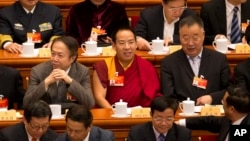A youth named by China as the second-highest figure in Tibetan Buddhism, but reviled as a fake by many Tibetans, has praised the Communist Party's religious policies in Tibet in a lunar new year message, saying they made him feel "very happy."
Although officially atheist, China selected Gyaltsen Norbu as the 11th Panchen Lama in 1995 in a drive to win the hearts and minds of Tibetans.
Tibet's current spiritual leader, the Dalai Lama, whom Beijing brands a dangerous separatist, had announced his own choice of a six-year-old boy, but he was taken away by authorities and has since vanished from public view.
In a message to mark the Tibetan lunar new year, carried by the United Front Work Department which helps oversee religious groups, China's Panchen Lama discussed six months of Buddhist activities he carried out in Tibet last year.
"My deepest impression after the inspection tour was that Tibet's ethnic and religious policies have been carried out very well," he said in comments carried late on Monday.
"At the same time, the party has formulated a series of special beneficial policies, and the vast majority of Tibetans have received real benefit. After seeing this I felt very happy," he said.
He added that he visited herders, where he got to understand the changes that have taken place for Tibetans.
"This has made me even more confident in Tibet's tomorrow," he said.
China has gradually exposed its Panchen Lama in public roles in the hope he will achieve the respect commanded by the Dalai Lama among Tibetans and globally. He made his first trip outside mainland China in 2012, when he visited Hong Kong.
Chinese troops marched into Tibet in 1950. China routinely rejects criticism of its rule there, saying it has brought much-needed development to a remote region and that it respects Tibet's culture and religion.
After the Dalai Lama fled to India in 1959, the 10th Panchen Lama stayed on and was initially seen as a collaborator. It later emerged that his criticism of Beijing had earned him more than a decade spent either in prison or under house arrest.
Freed in 1977, he was politically rehabilitated the following year, and died in 1989.





